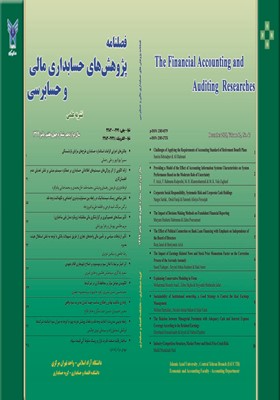رابطه بدبینی مدیریت با کفایت وجه نقدو دفعات پوشش هزینه بهره با توجه به میزان سود انباشته شرکتها
محورهای موضوعی : حسابداری مالی و حسابرسیقربانعلی اسماعیل زاده 1 , سید علی نبوی چاشمی 2 *
1 - گروه حسابداری،واحدبابل،دانشگاه آزاداسلامی،بابل،ایران
2 - گروه مدیریت مالی، واحدبابل،دانشگاه آزاداسلامی،بابل،ایران
کلید واژه: :بدبینی مدیریت, کفایت وجه نقد, دفعات پوشش هزینه بهره, میزان سود انباشته شرکتها,
چکیده مقاله :
در این تحقیق به بررسی تأثیربدبینی مدیریت بر کفایت وجه نقدو دفعات پوشش هزینه بهره با توجه به میزان سود انباشته شرکتها پرداخته شد برای رسیدن به این هدف چهار فرضیه مطرح گردیدند و برای آزمون فرضیات تحقیق دادههای 93 شرکت از شرکتهای پذیرفته شده در بورس اوراق بهادار تهران با استفاده از روش نمونهگیری حذف سیستماتیک برگزیده شد. برای انجام آزمون آماری فرضیههای تحقیق رگرسیون چند متغیره مورد استفاده قرار گرفت. نتایج حاصله نشان میدهد بدبینی مدیریت بر کفایت وجه نقد و دفعات پوشش هزینه بهره در شرکتهای با سود انباشته پایین تأثیر معنیداری معکوس دارد؛ اما بدبینی مدیریت بر کفایت وجه نقد و دفعات پوشش هزینه بهره در شرکتهای با سود انباشته بالا تأثیر معنیداری ندارد. This study examines the relationship between pessimism and frequency efficient management of cash interest expense coverage according to the company's retained earnings. To achieve this goal, four hypotheses was used and to test hypotheses, data from 93 firms listed in the Tehran Stock Exchange by using systematic sampling were selected. To perform multiple regression test hypotheses using software was used SPSS17. The results show that pessimism is that the efficient management of cash and frequency coverage of interest expense In companies with retained earnings down significantly as there is an inverse relationship.But the pessimism efficient management of cash and frequency coverage of interest expense in companies with high retained earnings, there is no relation.
1) اسماعیلزاده مقری، علی، محمد محمودی، سیدامین هادیان و احمد برگ بید، (1394)، "تأثیرساختارمالکیتبررابطهبینجریانوجهنقدآزادو مدیریتاستفادهبهینهازداراییها"، پژوهشهای حسابداری مالی و حسابرسی سال 7، شماره 28، صص 41-23.
2) احمدپور، احمد و هادی منتظری، (1390)،"نوع مدیریت سود و تأثیر اندازه شرکت، ساختار مالکیت و حاکمیت شرکتی بر آن"، مجله پیشرفتهای حسابداری، دوره سوم، شماره دوم، صص 35-1.
3) آقایی، محمد علی، احمدرضا نظافت، مهدی ناظمی اردکانی و علی اکبر جوان، (1388)، "بررسی عوامل مؤثر بر نگهداری موجودیهای نقدی در شرکتهای پذیرفته شده در بورس اوراق بهادار تهران"، پژوهشهای حسابداری مالی، سال اول، شماره 2، صص 53-70
4) علی نژاد ساروکلائی، مهدی و مریمصبحی، (1395)، "تأثیر بیش اعتمادی مدیران بر ساختار سرمایه"، پژوهشهای حسابداری مالی و حسابرسی سال 8، شماره 31، صص 109-93.
5) خواجوی، شکراﷲ و انور بایزیدی، (1391)، "بررسی رابطه بین اقلام تعهدی و میزان نگهداری داراییهای نقدی شرکتهای پذیرفته شده در بورس اوراق بهادار تهران، مجله دانش حسابداری، سال سوم، شماره 9، صص 76-55.
6) گرد عزیز، منصور محمدی و مجید گل دوست،(1394)، "بررسی رابطه بین ویژگیهای حاکمیت شرکتی و وجه نقد نگهداری شده"، بررسیهای حسابداری و حسابرسی دوره 22، شماره 2.
7) مراد زندی، آناهیتا و محسن تنانی،(1394)، "تأثیر جریان وجه نقد آزاد و سطح انباشت وجه نقد بر انعطافپذیری مالی"، پژوهشهای حسابداری مالی و حسابرسی، سال 7، صص 71-57.
8) Bergstresser, Daniel B., Philippon, Thomas, )2006(, “CEO Incentives and Earnings Management”, Journal of Financial Economics 80, PP. 511–529.
9) Bowen, Robert M., Rajgopal, Shivaram, Venkatachalam, Mohan, )2008(, “Accounting Discretion, Corporate Governance and Firm Performance”, Contemporary Accounting Research 25 (2), PP. 351–405.
10) Boubaker, S., Derouiche, I. & Nguyen, D, (2015), “Does the Board of Directors Affect Cash Holdings? A study of French Listed Firms”, Journal of Management & Governance, 19(2), PP. 341-370.
11) Christa H. S.Bouwman, (2016), "Managerial Pessimism and Adequacy Cash and Time Interest Earned", Journal of Banking & Finance
12) Drobetz, Wolfgang; Grüninger, Matthias C, (2007), “Corporate Cash Holdings: Evidence from Switzerland”, Fin Mkts Portfolio Mgmt 21, PP. 293–324.
13) Faulkender, M., and R.Wang, (2006), “Corporate Financial Policy and the Value of Cash”, Journal of Finance 61, PP. 1957–1990.
14) Garcia-Teruel, P. J., and P. Martinez-solano, (2008), "On the Determinants of SME Cash Holdings: Evidence from Spain”, Journal of Business Finance and Accounting 35.
15) Ge, Weili, Matsumoto, Dawn, Zhang, Jenny,)2011(, “Do CFOs Have Style? An Empirical Investigation of the Efect of Individual CFOs on Accounting Practices”, Contemporary Accounting Research 28, PP. 1141–1179.
16) Harford, Jarrad, Mansi, Sattar A. & William F.Maxwell, (2008), "Corporate Governance and Firm Cash Holdings", Journal of Financial Economics, Vol. 87, PP. 535-555.
17) Hribar, Paul, Yang, Holly, )2012(, “CEO Overconfidence and Management Forecasting”, Working Paper.
18) Healy, Paul M., )1985(, “The Effect of Bonus Schemes on Accounting Decisions”, Journal of Accounting and Economics 7 (1–3), PP. 85–107.
19) Jeffrey Ng, İrem Tuna, Rodrigo Verdi, (2012), "Management Forecasts, Disclosure Quality, and Market Efficiency", The Wharton School University of Pennsylvania 1303 Steinberg Hall-Dietrich Hall.
20) Klein, April, )2002(, “Audit Committee, Board of Director Characteristics, and Earnings Management”, Journal of Accounting and Economics 33, PP. 375–400.
21) Kim, Jiyoung, Kim, Hyunjoon and Woods, David, (2011), “Determinants Of Corporate Cash-Holding Levels, An Empirical Examination Of The Restaurant Industry”, International Journal Of Hospitality Management 30, PP. 568–574.
22) Lee, Cheng Few, (2009), "Cash Holdings, Corporate Governance Structure and Firm Valuation", Review of Pacific Basin Financial Markets and Policies, Vol.12, No.3, PP.475-508.
23) Louis, Henock, Amy Sun and Oktay Urcan, (2010), "Value of Cash Holdings and Accounting Conservation", Financial Accounting and Reporting Section (FARS) Paper.Http://SSRN.Com/.
24) Opler, T., Pinkowitz, L., Stulz, R. And Williamson, R. (1999), “The Determinants and Implications of Corporate Cash Holdings”, Journal of Financial Economics 52, PP. 3–46.
25) Pinkowitz, L., Stulz, R. & R.Williamson, (2004), “Do Firms with Poor Protection of Investor Rights Hold More Cash?”, Working Paper, Georgetown University, PP.1-45.
26) Schrand, Catherine M., Zechman, Sarah L.C., )2012(, “Executive Overconfidence and the Slippery Slope to Financial Misreporting”, Journal of Accounting and Economics 53 (1), PP. 311–329.
27) Subramaniam, Venkat, Tony T.Tang, Heng Yue, Xin Zhou, (2011), ”Firm Structure and Corporate Cash Holdings”, Journal of Corporate Finance, No 17, PP. 759–773.
28) Yuanto, K, (2011), ”Do Corporate Governance Mechanisms Matter for Cash Holdings and Firm Value?”, Journal of Corporate Finance, No 17, PP. 725–740.
یادداشتها

